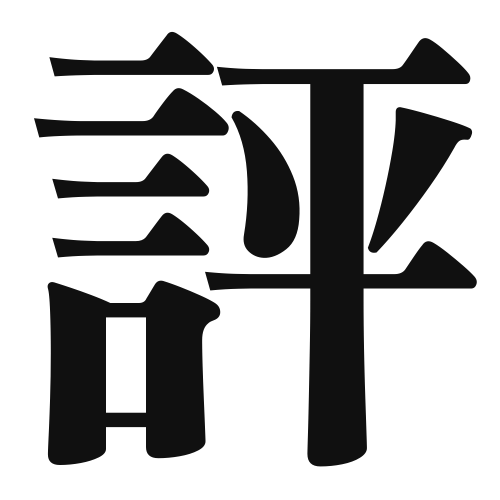1. Overview of Meaning
The kanji “評” (hyou) generally means “to evaluate” or “to assess.” It is often used in contexts related to judgment, criticism, or commentary.
2. Formation and Radical
Formation of the Kanji: The kanji “評” is a compound character, which means it is formed by combining different elements. It consists of the phonetic component “平” (hira), which means “flat” or “even,” and the radical “言” (gen), which relates to speech or words. This combination suggests the idea of evaluating or discussing something in a balanced manner.
Radical: The radical of “評” is “言” (gen), indicating its connection to language and communication.
3. Examples of Usage
Common Words and Phrases: Some frequently used words that include “評” are:
- 評価 (hyouka) – evaluation
- 批評 (hihyou) – criticism
- 評判 (hyouban) – reputation
Example Sentences in Daily Conversation:
- この映画の評判はどうですか? (Kono eiga no hyouban wa dou desu ka?) – What is the reputation of this movie?
- 彼の評価はとても高いです。 (Kare no hyouka wa totemo takai desu.) – His evaluation is very high.
4. Synonyms and Antonyms
Similar Kanji: A similar kanji is “査” (sa), which means “to investigate” or “to examine.” While both involve assessment, “査” focuses more on the act of investigation, whereas “評” emphasizes judgment or evaluation.
Antonyms: An antonym of “評” could be “無視” (mushi), which means “to ignore.” This represents the opposite action of evaluating or assessing something.
5. Cultural and Historical Background
Connection to Japanese Culture: The concept of evaluation is significant in Japanese culture, especially in contexts like education and business, where assessments play a crucial role in personal and professional development.
Proverbs and Idioms: One relevant proverb is “評判が良い” (hyouban ga yoi), meaning “to have a good reputation,” which highlights the importance of how one is perceived by others.
